英语八年级下册 Unit 4 Why don‘t you talk to your parents ? Section A (1a-2d)课件(共有PPT37张,含音频)
文档属性
| 名称 | 英语八年级下册 Unit 4 Why don‘t you talk to your parents ? Section A (1a-2d)课件(共有PPT37张,含音频) |  | |
| 格式 | pptx | ||
| 文件大小 | 4.6MB | ||
| 资源类型 | 教案 | ||
| 版本资源 | 人教新目标(Go for it)版 | ||
| 科目 | 英语 | ||
| 更新时间 | 2022-01-03 16:15:37 | ||
图片预览

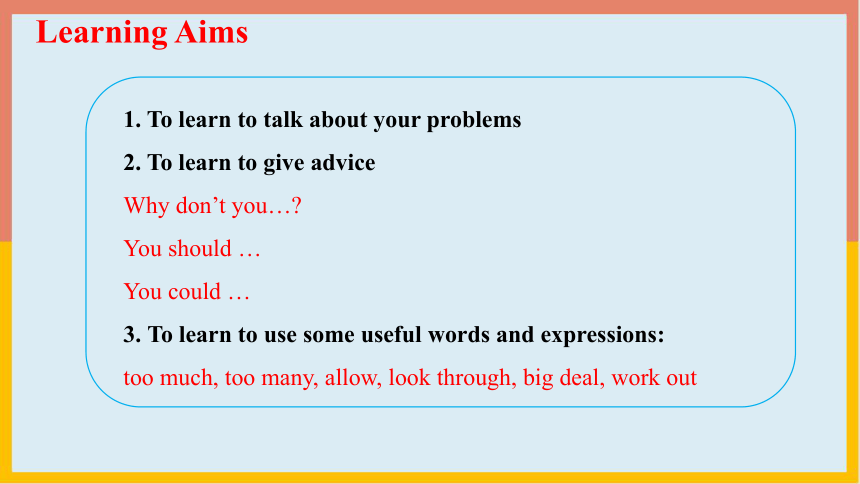
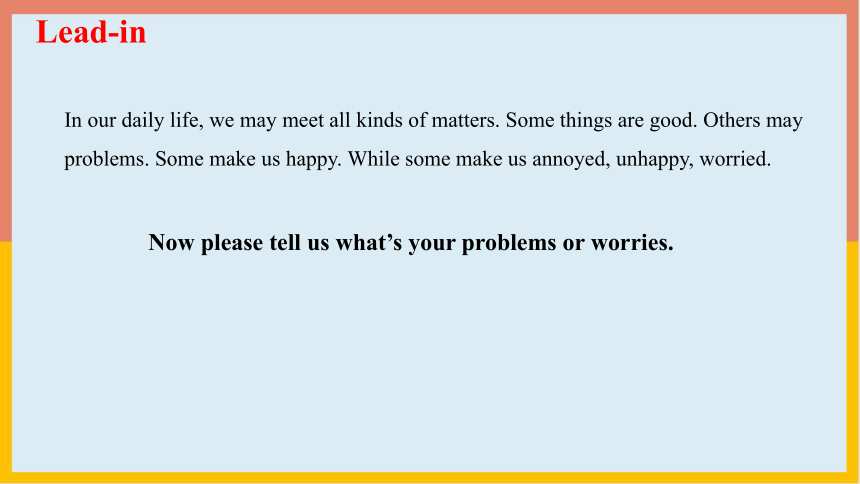
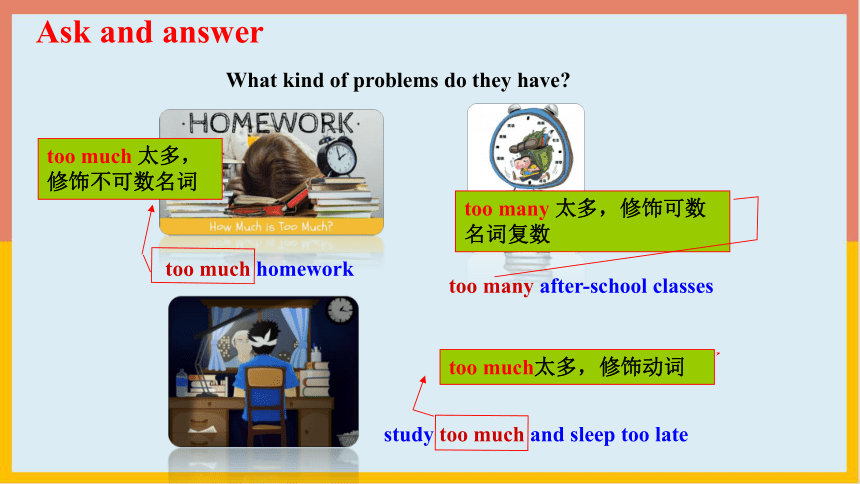
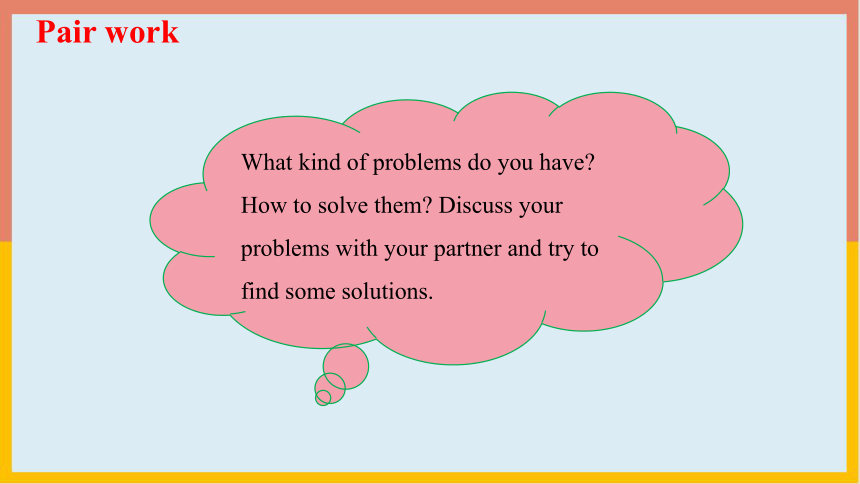
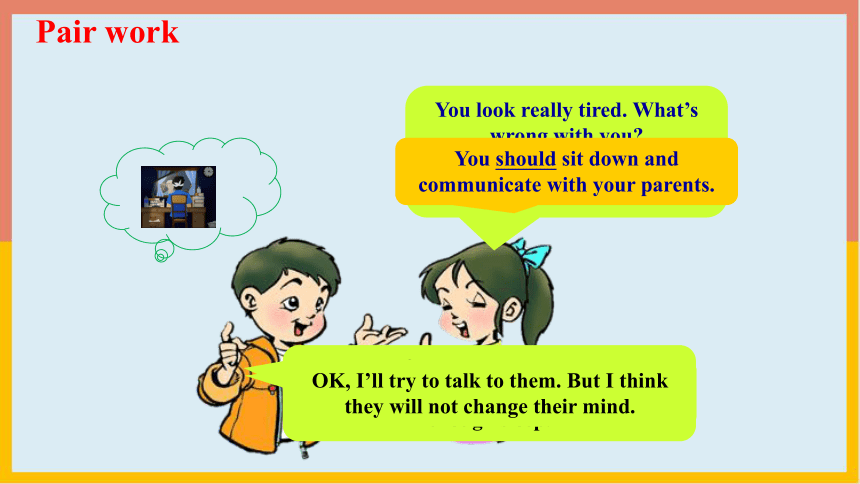
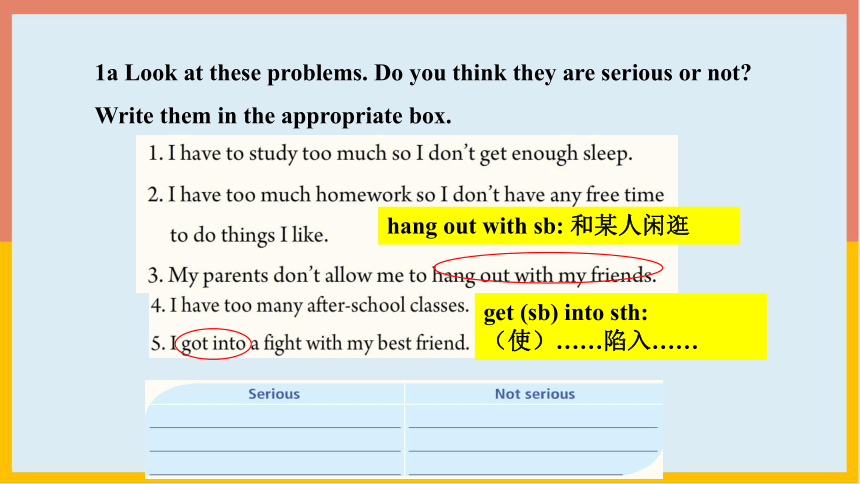
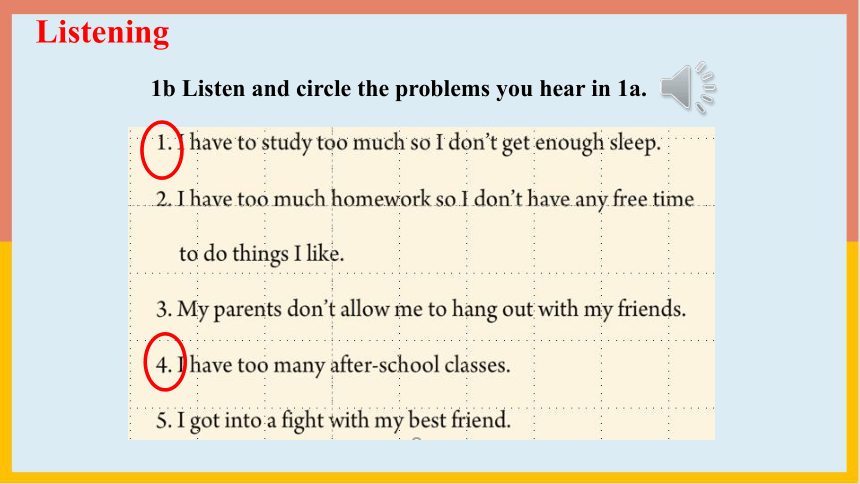
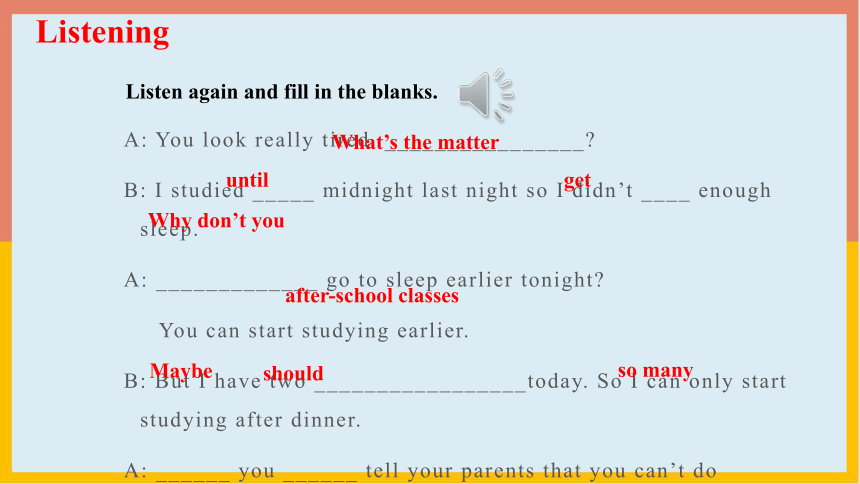
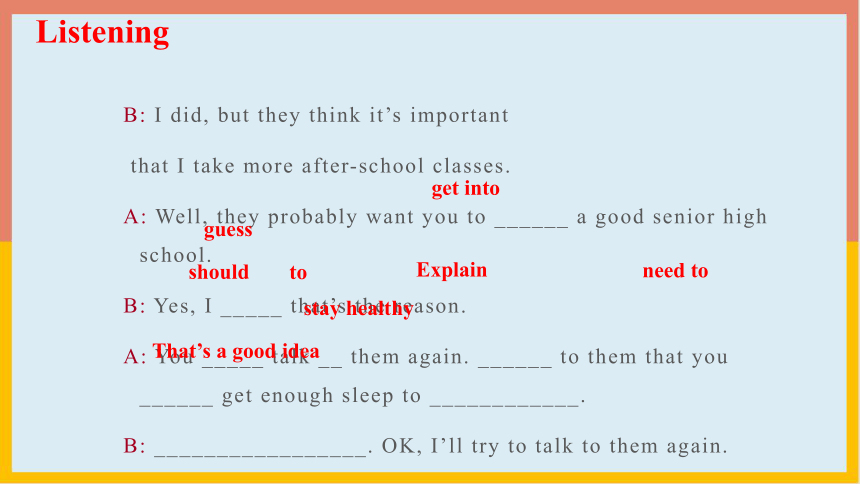
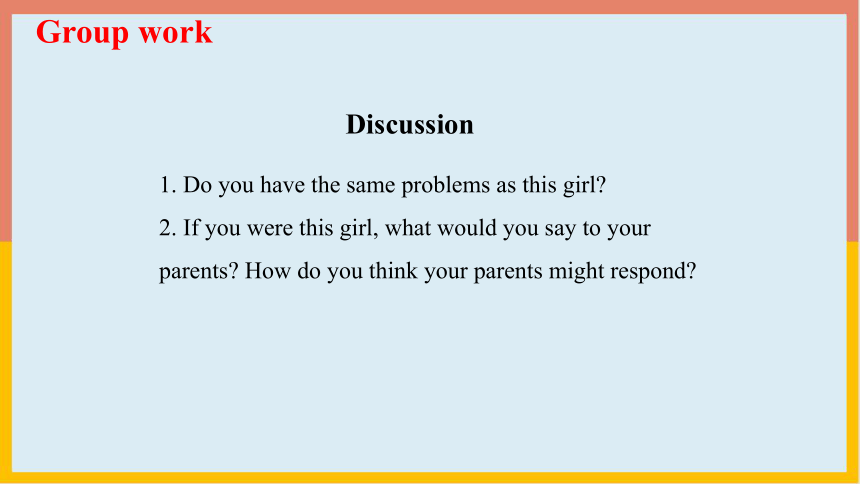
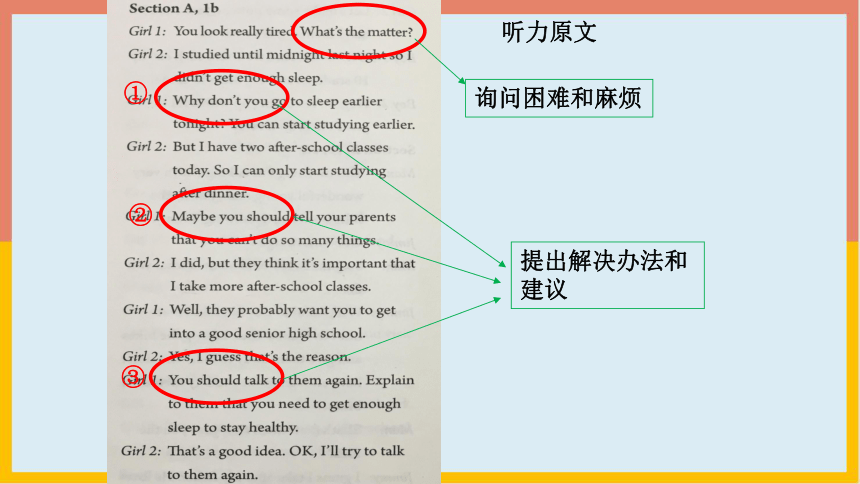
文档简介
(共37张PPT)
Unit 4 Why don't you talk to your parents
Section A ( 1a-2d )
1. To learn to talk about your problems
2. To learn to give advice
Why don’t you…
You should …
You could …
3. To learn to use some useful words and expressions:
too much, too many, allow, look through, big deal, work out
Learning Aims
Lead-in
In our daily life, we may meet all kinds of matters. Some things are good. Others may problems. Some make us happy. While some make us annoyed, unhappy, worried.
Now please tell us what’s your problems or worries.
Ask and answer
What kind of problems do they have
too many 太多,修饰可数名词复数
too much homework
too much 太多,修饰不可数名词
study too much and sleep too late
too many after-school classes
too much太多,修饰动词
What kind of problems do you have How to solve them Discuss your problems with your partner and try to find some solutions.
Pair work
I had two after-school classes yesterday. I have to study too much so I don’t get enough sleep.
OK, I’ll try to talk to them. But I think they will not change their mind.
You look really tired. What’s wrong with you
You should sit down and communicate with your parents.
Pair work
hang out with sb: 和某人闲逛
get (sb) into sth:
(使)……陷入……
1a Look at these problems. Do you think they are serious or not
Write them in the appropriate box.
1b Listen and circle the problems you hear in 1a.
Listening
A: You look really tired. ________________
B: I studied _____ midnight last night so I didn’t ____ enough sleep.
A: _____________ go to sleep earlier tonight
You can start studying earlier.
B: But I have two _________________today. So I can only start studying after dinner.
A: ______ you ______ tell your parents that you can’t do _______ things.
Listen again and fill in the blanks.
What’s the matter
until
get
Why don’t you
after-school classes
Maybe
should
so many
Listening
B: I did, but they think it’s important
that I take more after-school classes.
A: Well, they probably want you to ______ a good senior high school.
B: Yes, I _____ that’s the reason.
A: You _____ talk __ them again. ______ to them that you ______ get enough sleep to ____________.
B: _________________. OK, I’ll try to talk to them again.
get into
guess
should
to
Explain
need to
stay healthy
That’s a good idea
Listening
1. Do you have the same problems as this girl
2. If you were this girl, what would you say to your parents How do you think your parents might respond
Discussion
Group work
听力原文
询问困难和麻烦
提出解决办法和建议
①
②
③
A: What’s wrong
B: I’m really tired because I studied until midnight last night.
A: Why don’t you go to sleep earlier this evening
Look at the problems in 1a and make conversations.
1c
Work in pairs
Listen. Peter’s friend is giving him advice. Fill in the blanks with could or should.
2a
1. You _____ write him a letter.
2. You ______ call him up.
3. You ______ talk to him so that you can say you’re sorry.
4. You ______ go to his house.
5. You _____ take him to the ball game.
could
should
should
could
could
call sb up
打电话给某人
Listening
Listen again. Why doesn’t Peter like his friend’s advice
2b
1.You could write him a letter.
2.You should call him up.
3.You should talk to him
so that you can say you’re sorry.
4.You could go to his house.
5.You could take him to
the ball game.
a. It’s not easy.
b. I don’t want to wait that long.
c. I don’t want to surprise him.
d. I’m not good at writing letters.
e. I don’t want to talk about it on the phone.
Advice
Reasons
Listening
听力原文
询问他人的困难
陈述自己的麻烦
表达建议
Role-play a conversation between Peter and his friend.
A: What’s the matter, Peter
B: I had a fight with my best friend. What should I do
A: Well, you should call him so that you can say you’re sorry.
2c
Work in pairs
Dave: You sad look Kim. wrong What’s
Kim: Well, I my sister looking found through my things yesterday. She magazines some of my took new and CDs.
Dave: Hmm…that’s very not nice. Did give she them to back you
Kim: Yes, but I’m angry still with her. should I What do
Dave: Well, I you could guess tell her sorry to say. But don’t you forget why about it you can be friends so that again she’s wrong, it’s not a big Although deal.
Kim: right You’re. Thanks your for advice.
Dave: problem No. Hope work things out.
Listen and read
Who has a problem What’s wrong with him/ her
Read the dialogue in 2d, then answer the questions below.
Kim has a problem. He found his sister looking through his things yesterday. And she took something.
Dave gave him the advice. Dave thought Kim could tell his sister to say sorry and forgot about that.
2. Who’s giving advice What’s his/her advice
Reading
Read the conversation in 2d and learn it by heart.
Then try to put the following in the right order.
Tips:
1. Read the dialogue aloud for a few minutes by yourself;
2. Role play in groups;
3. Role play in front of the class.
We’ll see which group does the best.
2d
Role play
Group work
Kim found his sister _____________ his things yesterday and she took some of his new magazines and CDs. Though she __________ ______ to Kim, he’s still __________ her. Dave said, “I guess you _________ her to say sorry. But ____________ forget about it ______ you can be friends again. Although she’s wrong, it’s not a ________.” In the end, Dave hopes things _________.
Fill in the blanks according to conversation C.
looking through
gave them
back
angry with
could tell
why don’t you
so that
big deal
work out
Post-reading
1. 太多家庭作业
2. 允许某人做某事
3. 与朋友一起闲逛
4. 太多课外课
5. 与某人打架
6. 打电话给某人
7. 带某人去看球赛
too much homework
allow sb. to do sth.
hang out with friends
too many after-school classes
fight with sb.
call sb. up
take sb. to the ball game
Translate the following expressions into English.
Post-reading
8. 打电话
9. 对某人说对不起
10. 发现某人正在做某事
11. 归还给某人
12. 生某人的气
13. 不要忘记做某事
14. 没什么大不了
15. 解决
call sb.
say sorry to sb.
find sb. doing sth.
give sth. back to sb.
be angry with sb.
don’t forget to do sth.
It’s not a big deal.
work out
Translate the following expressions into English.
Post-reading
1. My parents don’t allow me to hang out with my friends.
allow:
allow sb. to do sth. :
允许某人做某事
1)Pets aren’t allowed in this hotel.
这个旅馆不准许将宠物带入。
2)His parents won't allow him to stay out late.
他的父母不会允许他在外待得很晚.
3)You're not allowed to talk during the exam.
考试期间不许交谈。
v. 允许,准许
Language points
2. I found my sister looking through my things yesterday.
look through:to look for sth among a pile of papers, in a drawer, in sb’s pockets etc.
1) I’ve looked through all my papers but I still can’t find the contract(合同).
我翻找了我所有文件但是没有找到那份合同。
2) He looked through the pile, trying to decide which one to pick.
他在那堆东西里翻找,想确定该挑哪一个。
我发现我姐姐昨天翻找我的东西。
Language points
1) The fact is, it is a big deal.
事实是,这是个大事。
3. Although she’s wrong, it’s not a big deal.
虽然她错了,但也不是多大的事。
Language points
2) That may not seem like a big deal, but for me it was a triumph(巨大成功).
这看起来似乎没什么,但对我来说是一个巨大成功。
3) It’s no big deal. Everybody forgets things sometimes.
没什么大不了的。有时候人人都会忘记事情的。
4) We’ll have to pay a little more – it’s no big deal.
我们得付多点钱——没关系的。
big deal: an important event 大事
It’s no big deal: 没关系的;没什么大不了的
Language points
1) Things will work out, you’ll see.
情况会好转的,你等着瞧吧。
2) I hope it all works out for Gina and Andy.
我希望吉娜和安迪的情况会好转。
3) Try not to worry. I'm sure everything will work out in the end.
别担心,我相信最终一切都会好起来的。
4. No problem. Hope things work out.
没问题,会好起来的。
work out:if a problem works out, it gradually gets better or gets solved.逐步化解/好转或解决
Language points
Summary
What have you learnt
Tips: 1. Two minutes to test your spelling.
2.When finishing, exchange your papers to see who does the best.
1. English-Chinese
wrong, midnight, deal, relation, cloud, communication, whatever, communicate
2. Chinese-English
允许;哪儿不舒服?浏览;猜测;重要的事;解决;和睦相处;争吵;年纪较长的;代替;焦虑的;主动提出;正确的;其次;解释;晴朗的
Spelling
Exercise
Do the exercises online!
Unit 4-Section A-1随堂检测
1.Preview the new words and expressions.
2.Preview Unit 4 Why don’t you talk to your parents -Section A-2课件
Homework
课外趣读
我们如何与父母沟通
所谓沟通,是让彼此明白对方的心意及表达自己想法的一种方法。我们与父母进行沟通,其实是辨明是非,寻求最佳结果的过程。有效沟通要掌握以下基本要领:
1、了解是前提。了解父母,沟通就有主动权。知道父母怎么想,怎样处事,有什么兴趣爱好,是什么脾气秉性,对我们有什么期望,我们与他们沟通就有了预见性和主动权。
2、尊重理解是关键。尊重是与父母交往的基本要求。如果连最爱自己、对自己付出最多的人都不尊重,就失去了最起码的道德。与父母正常沟通首先要理解父母,理解其心情,尊重其意愿,还要讲求基本的礼貌,不能任性。
课外趣读
3、理解父母的有效方法是换位思考。当我们不理解父母、与父母冲突的时候,要学会换位思考,替他们想一想,了解他们是为了什么,有什么想法,有什么道理。这会使我们变得更加冷静和理智。
4、沟通的结果要求同存异。沟通不要走极端,两代人之间毕竟存在差异,难免有不同的观点、动机和行为方式。正因为有分歧,所以才要沟通。这种沟通,不一定非要统一不可,而要求同存异。找到同,我们就有了共同的语言和行动;保存异,就是保存对父母的尊重和理解。
另外,我们要克服闭锁心理,向父母传递有关自己的信息和情况,表达自己的心情,说出自己的意见,让父母了解自己。我们要保持自己的独立性,但不要忽略与父母的交流与沟通。与父母发生矛盾时,要耐心解释,让父母听得进,以得到他们对自己的理解。解释时说话放低声调,斟酌词句,有商有量。即使父母不对,也要就事论事,不对父母本人,更不能迁怒于父母。
课外趣读
我们如何与父母沟通
不管怎么说,长辈也是从我们这个年龄走过来的,他们也经历过“疾风骤雨”时期,以他们几十年的人生经历,看问题要成熟得多。我们在慢慢长大,应该学着独立,但独立和成熟有个过程,不是突然的。要经常坐下来,跟爸爸谈谈你在学校的情况,跟妈妈谈谈你遇到的烦恼,这样父母也会诚恳地与你交谈,从中你可以得到很多有益的启示。不要认为跟父母谈心是“没长大”,善于沟通正是你越来越成熟、独立的表现。在交流沟通中,说不定父母也会受到你的影响,接受一些年轻人认可的新生事物,那样,会无意中缩小代沟,增进家庭亲情。父母是爱我们的,只要我们同样以爱的方式对待父母,沟通的障碍就会大大减少。
再见
Unit 4 Why don't you talk to your parents
Section A ( 1a-2d )
1. To learn to talk about your problems
2. To learn to give advice
Why don’t you…
You should …
You could …
3. To learn to use some useful words and expressions:
too much, too many, allow, look through, big deal, work out
Learning Aims
Lead-in
In our daily life, we may meet all kinds of matters. Some things are good. Others may problems. Some make us happy. While some make us annoyed, unhappy, worried.
Now please tell us what’s your problems or worries.
Ask and answer
What kind of problems do they have
too many 太多,修饰可数名词复数
too much homework
too much 太多,修饰不可数名词
study too much and sleep too late
too many after-school classes
too much太多,修饰动词
What kind of problems do you have How to solve them Discuss your problems with your partner and try to find some solutions.
Pair work
I had two after-school classes yesterday. I have to study too much so I don’t get enough sleep.
OK, I’ll try to talk to them. But I think they will not change their mind.
You look really tired. What’s wrong with you
You should sit down and communicate with your parents.
Pair work
hang out with sb: 和某人闲逛
get (sb) into sth:
(使)……陷入……
1a Look at these problems. Do you think they are serious or not
Write them in the appropriate box.
1b Listen and circle the problems you hear in 1a.
Listening
A: You look really tired. ________________
B: I studied _____ midnight last night so I didn’t ____ enough sleep.
A: _____________ go to sleep earlier tonight
You can start studying earlier.
B: But I have two _________________today. So I can only start studying after dinner.
A: ______ you ______ tell your parents that you can’t do _______ things.
Listen again and fill in the blanks.
What’s the matter
until
get
Why don’t you
after-school classes
Maybe
should
so many
Listening
B: I did, but they think it’s important
that I take more after-school classes.
A: Well, they probably want you to ______ a good senior high school.
B: Yes, I _____ that’s the reason.
A: You _____ talk __ them again. ______ to them that you ______ get enough sleep to ____________.
B: _________________. OK, I’ll try to talk to them again.
get into
guess
should
to
Explain
need to
stay healthy
That’s a good idea
Listening
1. Do you have the same problems as this girl
2. If you were this girl, what would you say to your parents How do you think your parents might respond
Discussion
Group work
听力原文
询问困难和麻烦
提出解决办法和建议
①
②
③
A: What’s wrong
B: I’m really tired because I studied until midnight last night.
A: Why don’t you go to sleep earlier this evening
Look at the problems in 1a and make conversations.
1c
Work in pairs
Listen. Peter’s friend is giving him advice. Fill in the blanks with could or should.
2a
1. You _____ write him a letter.
2. You ______ call him up.
3. You ______ talk to him so that you can say you’re sorry.
4. You ______ go to his house.
5. You _____ take him to the ball game.
could
should
should
could
could
call sb up
打电话给某人
Listening
Listen again. Why doesn’t Peter like his friend’s advice
2b
1.You could write him a letter.
2.You should call him up.
3.You should talk to him
so that you can say you’re sorry.
4.You could go to his house.
5.You could take him to
the ball game.
a. It’s not easy.
b. I don’t want to wait that long.
c. I don’t want to surprise him.
d. I’m not good at writing letters.
e. I don’t want to talk about it on the phone.
Advice
Reasons
Listening
听力原文
询问他人的困难
陈述自己的麻烦
表达建议
Role-play a conversation between Peter and his friend.
A: What’s the matter, Peter
B: I had a fight with my best friend. What should I do
A: Well, you should call him so that you can say you’re sorry.
2c
Work in pairs
Dave: You sad look Kim. wrong What’s
Kim: Well, I my sister looking found through my things yesterday. She magazines some of my took new and CDs.
Dave: Hmm…that’s very not nice. Did give she them to back you
Kim: Yes, but I’m angry still with her. should I What do
Dave: Well, I you could guess tell her sorry to say. But don’t you forget why about it you can be friends so that again she’s wrong, it’s not a big Although deal.
Kim: right You’re. Thanks your for advice.
Dave: problem No. Hope work things out.
Listen and read
Who has a problem What’s wrong with him/ her
Read the dialogue in 2d, then answer the questions below.
Kim has a problem. He found his sister looking through his things yesterday. And she took something.
Dave gave him the advice. Dave thought Kim could tell his sister to say sorry and forgot about that.
2. Who’s giving advice What’s his/her advice
Reading
Read the conversation in 2d and learn it by heart.
Then try to put the following in the right order.
Tips:
1. Read the dialogue aloud for a few minutes by yourself;
2. Role play in groups;
3. Role play in front of the class.
We’ll see which group does the best.
2d
Role play
Group work
Kim found his sister _____________ his things yesterday and she took some of his new magazines and CDs. Though she __________ ______ to Kim, he’s still __________ her. Dave said, “I guess you _________ her to say sorry. But ____________ forget about it ______ you can be friends again. Although she’s wrong, it’s not a ________.” In the end, Dave hopes things _________.
Fill in the blanks according to conversation C.
looking through
gave them
back
angry with
could tell
why don’t you
so that
big deal
work out
Post-reading
1. 太多家庭作业
2. 允许某人做某事
3. 与朋友一起闲逛
4. 太多课外课
5. 与某人打架
6. 打电话给某人
7. 带某人去看球赛
too much homework
allow sb. to do sth.
hang out with friends
too many after-school classes
fight with sb.
call sb. up
take sb. to the ball game
Translate the following expressions into English.
Post-reading
8. 打电话
9. 对某人说对不起
10. 发现某人正在做某事
11. 归还给某人
12. 生某人的气
13. 不要忘记做某事
14. 没什么大不了
15. 解决
call sb.
say sorry to sb.
find sb. doing sth.
give sth. back to sb.
be angry with sb.
don’t forget to do sth.
It’s not a big deal.
work out
Translate the following expressions into English.
Post-reading
1. My parents don’t allow me to hang out with my friends.
allow:
allow sb. to do sth. :
允许某人做某事
1)Pets aren’t allowed in this hotel.
这个旅馆不准许将宠物带入。
2)His parents won't allow him to stay out late.
他的父母不会允许他在外待得很晚.
3)You're not allowed to talk during the exam.
考试期间不许交谈。
v. 允许,准许
Language points
2. I found my sister looking through my things yesterday.
look through:to look for sth among a pile of papers, in a drawer, in sb’s pockets etc.
1) I’ve looked through all my papers but I still can’t find the contract(合同).
我翻找了我所有文件但是没有找到那份合同。
2) He looked through the pile, trying to decide which one to pick.
他在那堆东西里翻找,想确定该挑哪一个。
我发现我姐姐昨天翻找我的东西。
Language points
1) The fact is, it is a big deal.
事实是,这是个大事。
3. Although she’s wrong, it’s not a big deal.
虽然她错了,但也不是多大的事。
Language points
2) That may not seem like a big deal, but for me it was a triumph(巨大成功).
这看起来似乎没什么,但对我来说是一个巨大成功。
3) It’s no big deal. Everybody forgets things sometimes.
没什么大不了的。有时候人人都会忘记事情的。
4) We’ll have to pay a little more – it’s no big deal.
我们得付多点钱——没关系的。
big deal: an important event 大事
It’s no big deal: 没关系的;没什么大不了的
Language points
1) Things will work out, you’ll see.
情况会好转的,你等着瞧吧。
2) I hope it all works out for Gina and Andy.
我希望吉娜和安迪的情况会好转。
3) Try not to worry. I'm sure everything will work out in the end.
别担心,我相信最终一切都会好起来的。
4. No problem. Hope things work out.
没问题,会好起来的。
work out:if a problem works out, it gradually gets better or gets solved.逐步化解/好转或解决
Language points
Summary
What have you learnt
Tips: 1. Two minutes to test your spelling.
2.When finishing, exchange your papers to see who does the best.
1. English-Chinese
wrong, midnight, deal, relation, cloud, communication, whatever, communicate
2. Chinese-English
允许;哪儿不舒服?浏览;猜测;重要的事;解决;和睦相处;争吵;年纪较长的;代替;焦虑的;主动提出;正确的;其次;解释;晴朗的
Spelling
Exercise
Do the exercises online!
Unit 4-Section A-1随堂检测
1.Preview the new words and expressions.
2.Preview Unit 4 Why don’t you talk to your parents -Section A-2课件
Homework
课外趣读
我们如何与父母沟通
所谓沟通,是让彼此明白对方的心意及表达自己想法的一种方法。我们与父母进行沟通,其实是辨明是非,寻求最佳结果的过程。有效沟通要掌握以下基本要领:
1、了解是前提。了解父母,沟通就有主动权。知道父母怎么想,怎样处事,有什么兴趣爱好,是什么脾气秉性,对我们有什么期望,我们与他们沟通就有了预见性和主动权。
2、尊重理解是关键。尊重是与父母交往的基本要求。如果连最爱自己、对自己付出最多的人都不尊重,就失去了最起码的道德。与父母正常沟通首先要理解父母,理解其心情,尊重其意愿,还要讲求基本的礼貌,不能任性。
课外趣读
3、理解父母的有效方法是换位思考。当我们不理解父母、与父母冲突的时候,要学会换位思考,替他们想一想,了解他们是为了什么,有什么想法,有什么道理。这会使我们变得更加冷静和理智。
4、沟通的结果要求同存异。沟通不要走极端,两代人之间毕竟存在差异,难免有不同的观点、动机和行为方式。正因为有分歧,所以才要沟通。这种沟通,不一定非要统一不可,而要求同存异。找到同,我们就有了共同的语言和行动;保存异,就是保存对父母的尊重和理解。
另外,我们要克服闭锁心理,向父母传递有关自己的信息和情况,表达自己的心情,说出自己的意见,让父母了解自己。我们要保持自己的独立性,但不要忽略与父母的交流与沟通。与父母发生矛盾时,要耐心解释,让父母听得进,以得到他们对自己的理解。解释时说话放低声调,斟酌词句,有商有量。即使父母不对,也要就事论事,不对父母本人,更不能迁怒于父母。
课外趣读
我们如何与父母沟通
不管怎么说,长辈也是从我们这个年龄走过来的,他们也经历过“疾风骤雨”时期,以他们几十年的人生经历,看问题要成熟得多。我们在慢慢长大,应该学着独立,但独立和成熟有个过程,不是突然的。要经常坐下来,跟爸爸谈谈你在学校的情况,跟妈妈谈谈你遇到的烦恼,这样父母也会诚恳地与你交谈,从中你可以得到很多有益的启示。不要认为跟父母谈心是“没长大”,善于沟通正是你越来越成熟、独立的表现。在交流沟通中,说不定父母也会受到你的影响,接受一些年轻人认可的新生事物,那样,会无意中缩小代沟,增进家庭亲情。父母是爱我们的,只要我们同样以爱的方式对待父母,沟通的障碍就会大大减少。
再见
同课章节目录
- Unit 1 What's the matter?
- Section A
- Section B
- Unit 2 I'll help to clean up the city parks.
- Section A
- Section B
- Unit 3 Could you please clean your room?
- Section A
- Section B
- Unit 4 Why don't you talk to your parents?
- Section A
- Section B
- Unit 5 What were you doing when the rainstorm came
- Section A
- Section B
- Review of Units 1-5
- Unit 6 An old man tried to move the mountains.
- Section A
- Section B
- Unit 7 What's the highest mountain in the world?
- Section A
- Section B
- Unit 8 Have you read Treasure Island yet?
- Section A
- Section B
- Unit 9 Have you ever been to a museum?
- Section A
- Section B
- Unit 10 I've had this bike for three years.
- Section A
- Section B
